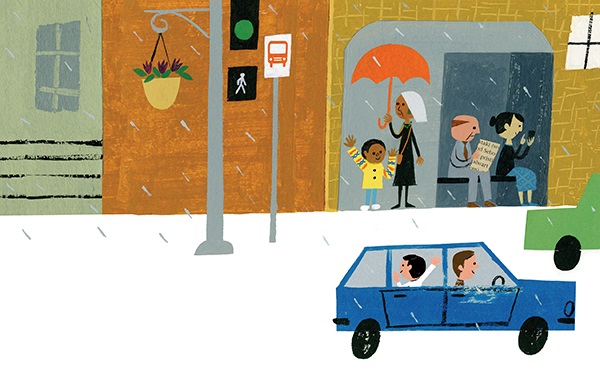Books for children featuring protagonists who go to church are increasingly rare these days. The 2016 Newbery Medal winner, Last Stop on Market Street by Matt de la Pena, is one of these rare ones. Of course, we never see the characters actually in church—we pick up with young CJf and his grandma just as they're leaving the service to go to an undisclosed location. It's somewhere they've been before, but the reader is kept in the dark until the last pages (though if you think hard enough about it you can probably figure it out in advance).
Last Stop on Market Street is a picture book. Christian Robinson's illustrations are 1970s retro, clearly influenced by the likes of Ezra Jack Keats and heavy on orange, blue and green. It's a pleasant enough book in its way—as CJ and Nana walk and ride the bus through the streets of their city (evidently Brooklyn, though never named), Nana helps her grandson see the beauty in their surroundings, in other people, and in the simple acts that people do for each other.

It's all a bit undefined and perhaps too subtle for its target audience, however. At one point, CJ. sees two older boys and says he wants one of those. Without the accompanying illustration you might come to the somewhat awkward conclusion that CJ wishes to possess one of the teenagers; even with it, younger readers/listeners might not pick up on the fact that what our hero wants is an iPod.
Pena likes metaphors, but he drops them in somewhat haphazardly, shifting from scene to scene with little or no warning and never an explanation that might help younger readers. For instance, when it starts to rain Nana tells CJ that a tree is drinking through a straw; CJ (and this reader) don't really know what she's talking about, and there's never an explanation. Pena also doesn't like conjunctions, and his writing style ends up somewhere between purely ungrammatical and mildly experimental.
CJ and grandma finally get to where they're going: a homeless shelter where they volunteer in the kitchen. At the outset, CJ didn't want to go, but now he's happy to be there and tells his grandma as much. She seems unsurprised. Presumably, CJ's new attitude is a result of grandma having shown him the wonders and beauty of the world around him, but their odyssey and Nana's commentary on it was so haphazard that such a conclusion is at best conjecture.

This conclusion reveals much about the book's beginning. Yes, we follow the protagonists from church, but there's no mention at any point of God, or creation, or anything spiritual that might allow us to put a Christian interpretation on the narrative. Rather, we're left with the unsatisfying humanism of our age. Of course, Christianity is humanistic in the sense that it ought to drive us to care for our fellow humans, but the sense of this book is little more than a kind of social gospel in which people do good because there's some good inside them already.
The point here is not to discount the importance of good-deed-doing. We should absolutely give our time to those in need, and working in a soup kitchen is an excellent way to do that. But there is a right motivation and a wrong motivation. As Christians, we serve others because they have the image of God in them; in this book, the protagonists serve others because they're beautiful, or because the world is beautiful, or something. It's all rather unclear, though we have no sense of a spiritual motivation.

As already mentioned, Last Stop on Market Street is nice enough, and there's certainly nothing offensive or inappropriate in it. The problem is, there's just not much in it. The message is kind of clear and yet remains pretty muddled, and most younger children are unlikely to pick up on the nuances the author introduces. In a world where Christianity is mostly mocked or condescended to, however, this may be the best we can expect from both authors and those who award their efforts.
Review by C. Hollis Crossman
C. Hollis Crossman used to be a child. Now he's a husband and father who loves church, good food, and weird stuff. He might be a mythical creature, but he's definitely not a centaur. Read more of his reviews
here.
Did you find this review helpful?